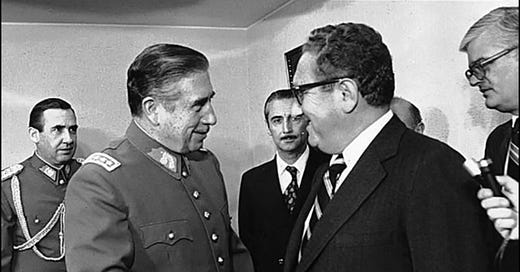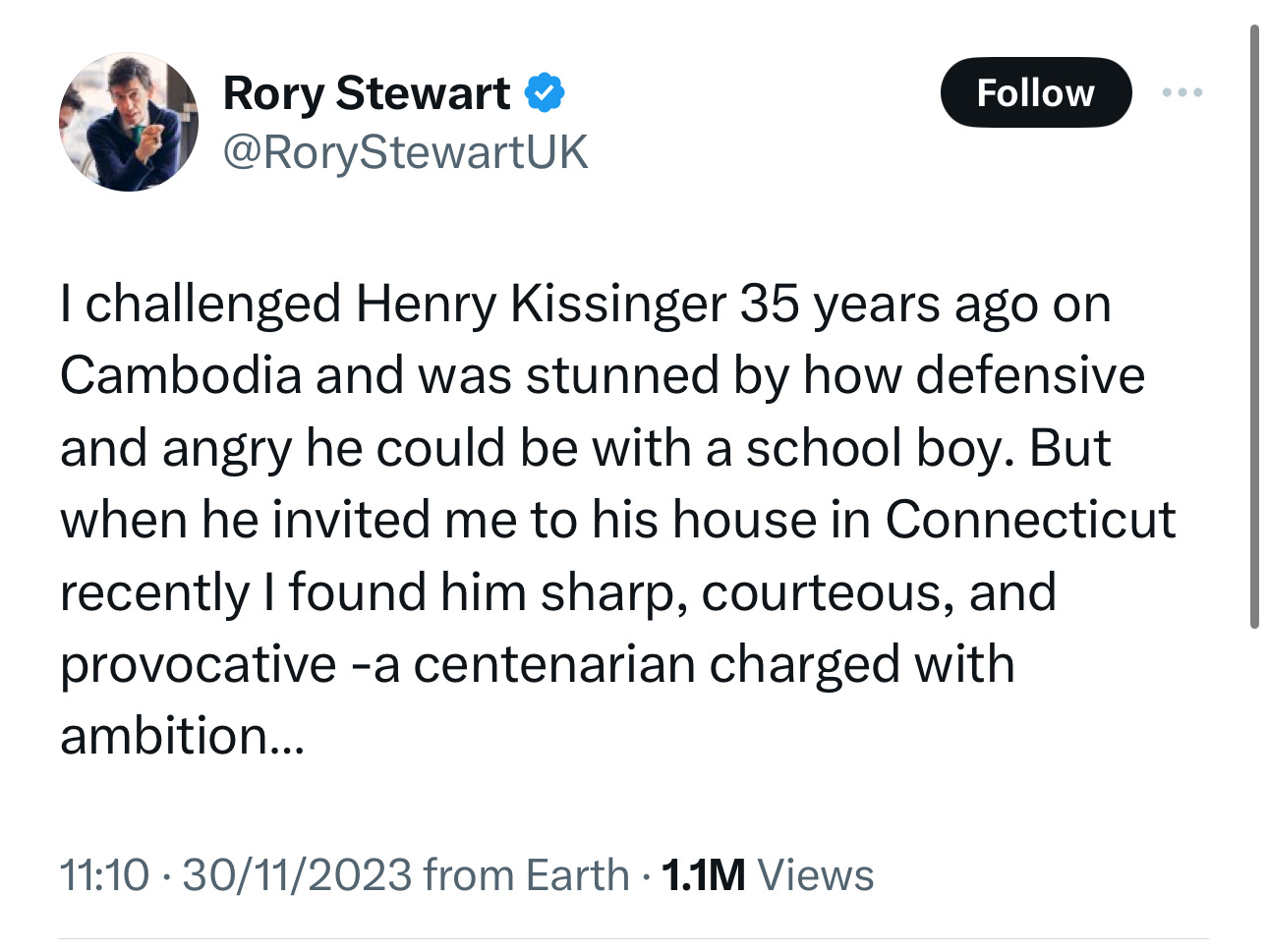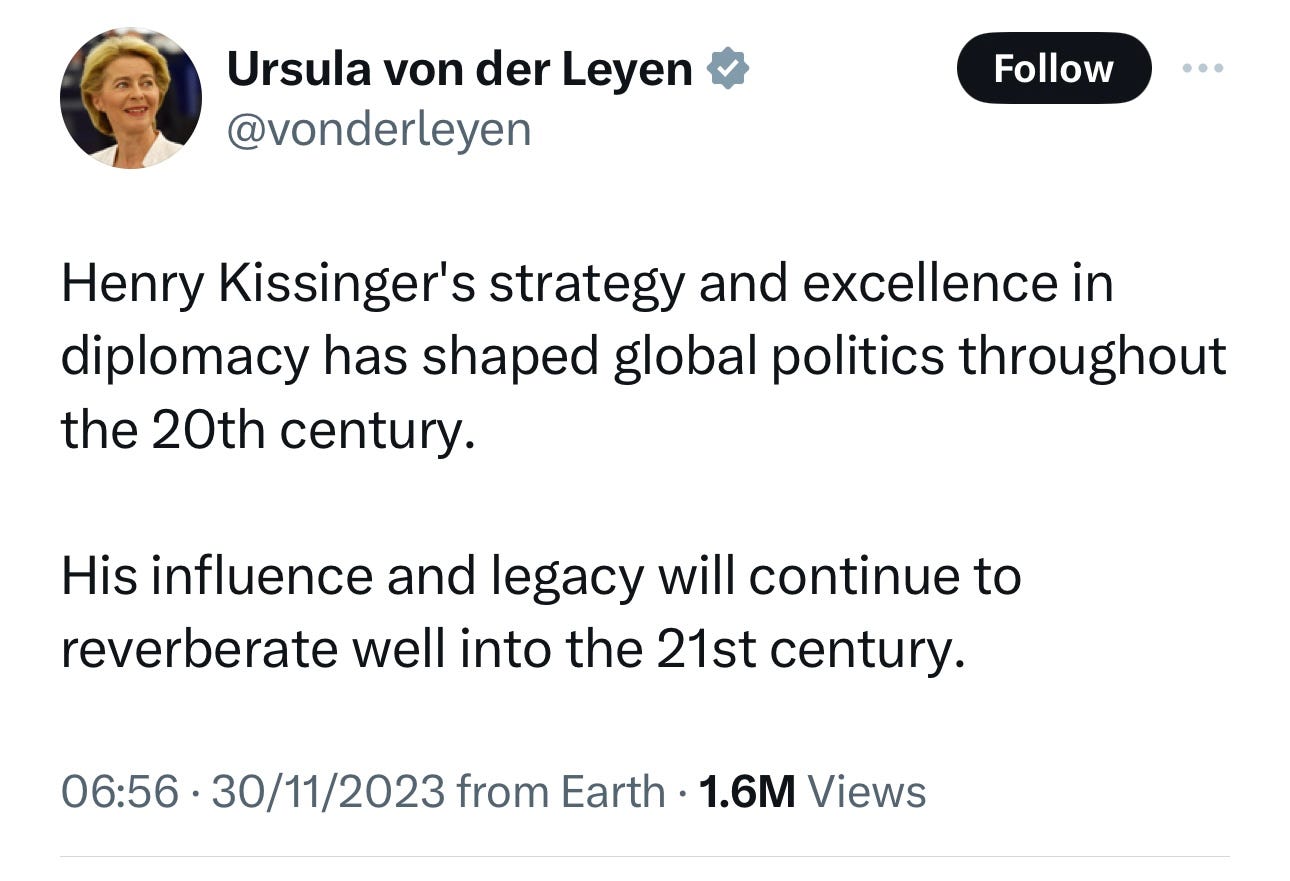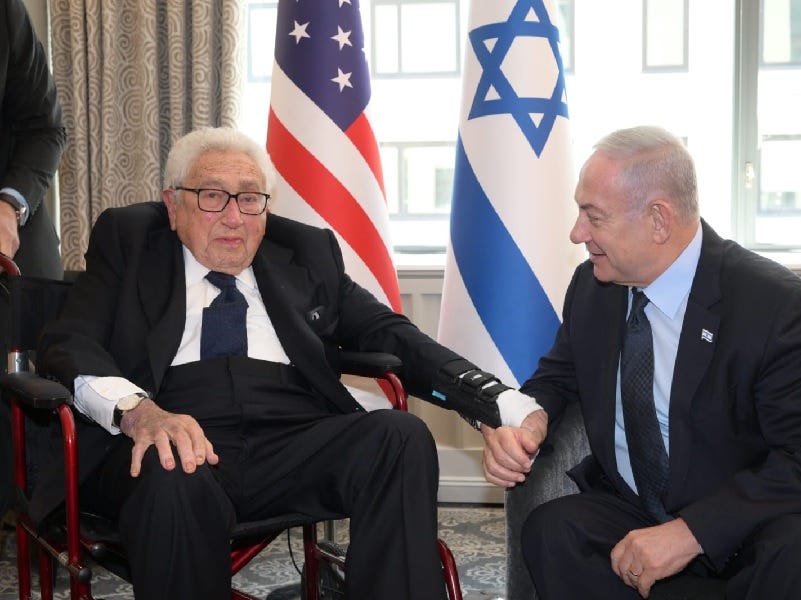The Kissinger Myth and why we owe it to his victims to demolish it
It falls to the living to drown out the sycophantic chorus
The Myth of Henry Kissinger
Henry Kissinger, the former secretary of state and national security advisor who died on 29 November, lived out the latter part of his life among celebrities and hangers on, basking in a curious prestige that overshadowed his various war crimes and the amoral support he proffered to fascist dictators. Indeed, until his final days Kissinger was able to command a large and sycophantic audience wherever he went - an audience that included influential journalists and scholars, former presidents and presidential candidates as well as other powerful figures.
Proximity to power invariably exhibits its own gravitational pull. But much of the reverence afforded to ‘Dr’ Kissinger is a product of the Kissinger Myth, a carefully crafted tale of strategic genius said to have unfolded while he was at the helm of one of the most powerful offices in America. The myth has been propagated by Kissinger himself and by countless others. The late historian Tony Judt summed the Myth up succinctly some fifteen years ago:
‘We found the world in a mess, [the Kissinger Myth] says: the cold war still frozen, the US trapped in a hopeless war in Southeast Asia, incoherent and contradictory American alliances and dealings with allies and enemies alike. In six short years we executed two truly radical departures: the opening to China and détente and arms agreements with the Soviet Union. We extricated the country from its Asian imbroglio, we propounded the “Nixon doctrine” whereby the US would support foreign allies without getting militarily embroiled in local conflicts, we set in place the basis for Middle Eastern dialogue, we established enduring personal and institutional relations with foreign statesmen, and we laid the groundwork for the great changes of the decades to come.’
Not all of this is without merit (as Judt notes). The opening of American diplomacy to China as well as arms control agreements with the Soviet Union may be seen as significant foreign policy achievements. But when setting those achievements against the carnival of violence that Kissinger unleashed on the world - indiscriminately raining bombs on civilian populations and pursuing policies whose bills would fall due in subsequent years - his record looks a lot less impressive. The illegal bombing of Cambodia was accurately described by William Bundy, foreign affairs advisor to presidents John F. Kennedy and Lyndon B. Johnson (and himself an architect of the Vietnam war), as ‘a black page in the history of American foreign policy’. During the 3,600 B-52 bombing raids carried out in Cambodia over a four year period (and kept hidden from Congress) hundreds of thousands of civilians were killed. This ‘grand strategic thinking’ on the part of Kissinger - together with Nixon and Alexander Haig - created the conditions in which the genocidal Khmer Rouge would come to power. Indeed it’s hard to look at this sequence of events without concluding that Kissingerian realpolitik was an abject failure on its own terms.
Of course the biggest myth of all holds that Kissinger, through his shrewd mastery of the negotiating table, brought about an end to the Vietnam war through the Paris settlement of 1973. This is an inversion of actual events. We now know that Nixon and Kissinger deliberately prolonged the war in order to trumpet their own peace deal - a deal they oversold to the American public and which subsequently unravelled soon after as South Vietnam fell to the Communists. Again, not exactly a resounding victory for grand strategic thinking.
The stated aim of such policies was usually to prevent smaller nations from ‘going communist’. Nowhere did this policy bear as much rotten fruit as in Latin America. In the late 1970s human rights groups estimate that nearly 30,000 people were ‘disappeared’ by the American-backed junta of Jorge Videla in Argentina (in collaboration, predictably enough, with the hierarchy of the Catholic Church). Victims of the regime reported seeing swastikas and pictures of Hitler on the walls of their torture chambers. US Secretary of State Henry Kissinger granted $50,000,000 in security assistance to the junta. “If there are things that have to be done, you should do them quickly,” Kissinger told Argentina’s foreign minister. He would later inform the junta that it had done ‘an outstanding job in wiping out terrorist forces’.
Nearly a decade earlier Nixon and Kissinger had helped an equally revolting cabal of military officers to overthrow Chile’s democratically elected Socialist president Salvador Allende. Kissinger played a direct role in a plan that involved the kidnap and subsequent killing of General René Schneider, the conservative head of the Chilean armed forces who had pledged to stay loyal to the constitution. Following General Pinochet’s coup, 17 years of fascist rule would follow in which thousands of innocent people were murdered, tortured and imprisoned by the military dictatorship. Unsurprisingly the Chilean ambassador to the United States greeted Kissinger’s death with a show of undisguised contempt: Kissinger, he wrote on Twitter (X), was ‘a man whose historical brilliance never managed to hide his profound moral wretchedness’.
Support under Nixon and Kissinger for the Shah of Iran had a similarly baleful affect on America’s reputation in the Middle East, while America’s influence over India is coloured to this day by that administration’s support for the Pakistan dictator Yahya Khan in 1971 as the latter violently suppressed riots in East Pakistan (which would culminate in the region breaking away and becoming Bangladesh). Such support was proffered to Pakistan on the basis that the latter was on good terms with China whereas India (one of Asia’s few democracies) was neutral and not sufficiently hostile toward the Soviet Union (‘Why is it our business how they govern themselves?’ asked Kissinger of Pakistan). Not only were 3 million Bengalis killed by the junta, but as with so many of Kissinger’s ventures, the enterprise failed on its own terms: the US backed the wrong side and subsequent American leaders were dealt a hand of reduced influence in the region.
One also does well to remember that peripheral nations do not always remain peripheral. Venture south of the Rio Grande today and a suspicion of North American motivations still emanates from the democratic parliaments whose existence Kissingerian diplomacy was often a bloody impediment to. One reason the United States is finding it hard to get countries such as Brazil and Chile to support Ukraine against Russia is due to a deep well of suspicion that has some of its origins in the Kissinger years. Anti-Americanism in the region did not start with Kissinger and Nixon, but like a pare of arsonists they doused that fire with enormous quantities of combustible fluid.
Power politics - and the contempt for small states and ordinary people that flows from it - is not the preserve of the right. In recent times sections of the left have taken to viewing the world through the prism of ‘spheres of influence’ and big power blocs. When Russia invaded Ukraine in February 2022 both the reactionary right and the isolationist left rushed to giddily cite the ‘realist’ scholar John Mearsheimer. Russian aggression was the West’s fault for attempting to ‘move Ukraine out of Russia’s orbit’, as Mearsheimer had written. Whose ‘orbit’ the Ukrainians themselves wished to be in was considered immaterial. The beauty of realist theory for its exponents is that such concerns can be loftily brushed aside.
While Kissinger gave American backing to dictatorships and death squads - in places including but not limited to Argentina, Chile, Paraguay, Bolivia, Uruguay and Brazil - he did so under the guise of eradicating ‘Communists’ and ‘terrorists’. Yet Kissinger was more than happy to cosy up to Mao Tse-tung and side with his hardline successors as they butchered thousands of students in Tiananmen Square (hosing their remains down nearby drains). ‘Since no government in the world would have tolerated having the main square of its capital occupied, a crackdown was therefore inevitable,’ wrote Kissinger, the mythical foe of dictatorial Communism. While Mikhail Gorbachev was opening up the Soviet Union to his ‘new thinking’, Kissinger steadfastly sided with Beijing’s unreconstructed Stalinists.
Kissinger effectively became a paid asset to China in later life. The increasingly toad-like Kissinger would show up regularly in Beijing, squatting next to some Stalinist gargoyle who’d taken the afternoon off from sending people to forced labour camps. This dynamic had been set in motion much earlier. The former assistant secretary of state Richard H. Solomon described Kissinger’s memoirs as ‘replete with almost awestruck recollections of the personal escorts, elaborate tours, and lavish banquets meticulously arranged by his Chinese hosts during his nine visits between 1971 and 1976’.
The fawning eulogies to Kissinger are I suspect a reflex action; some people can’t help but transform into a pool of sycophantic mush when they fall into the slipstream of a powerful individual. It is not a conscious or calculated thing so much as a product of a certain sensibility. The merest whiff of power and status and the cliches start to roll off the tongue in a great torrent. Here we have ascended the soaring peaks of what is sometimes called ‘civility’ politics.
I suppose this was inevitable. After all if you accept that Kissinger was a monster a lot of your other assumptions about the world will necessarily unravel. And so you cling faithfully to the shore, mechanically disgorging a few carefully road-tested pieties at the appropriate time. Kissinger meanwhile goes back to the dust from whence he came, the dust to which his victims long ago returned. In a just universe they would be there waiting for him, the little people contemptuously written out of history by the Historical Giant™. In our imperfect version it falls to the living to try to drown out the ingratiating wail of Henry Kissinger’s sycophantic hangers on. We owe his victims that much at least.








I stole this from Jacob T Levy who posted it to Twitter and a screenshot was shared on a blogpost but it sums up Kissinger perfectly
‘In a way that is all too familiar but ramped up to a world historic scale, he regularly indulged the slippage from “sometimes national security requires doing terrible things” to “the more terrible things I do, the more I must be a great man doing making hard choices and advancing national security” ‘
Also (now me again) the Chinese had him totally pegged didn’t they, flatter his ego, treat him like an important man, put on a good spread (and no doubt lots of women) sling him plenty of cash for his ‘consultancy’ and they have a voice pushing their agenda in the media and corridors of power for decades
The increasingly toad-like Kissinger would show up regularly in Beijing, squatting next to some Stalinist gargoyle who’d taken the afternoon off from sending people to forced labour camps
Just a great great sentence